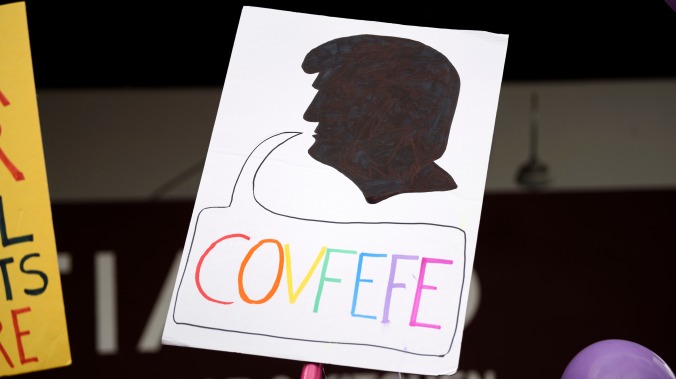From “deepfake” to “manspreading,” here’s a look at words that dawned in the 2010s

We explore some of Wikipedia’s oddities in our 5,971,223-week series, Wiki Wormhole.
This week’s entry: Words Coined in the 2010s
What it’s about: Language is ever embiggening, and the last ten years have seen many cromulent additions to our anaspeptic mother tongue. So let’s continue our end-of-decade contrafibularities with a compunctuous look at the phrasmotic phrases we’ve added in the 2010s.
Biggest controversy: There are a lot of politics-inspired words on the list. From infamous Trump typo “covfefe” and Sarah Palin non-word “refudiate” to “cuckservative” (which turns the right’s favorite insult against those on the right who aren’t considered conservative enough) to “Brexit,” we’ve had to learn a lot of new words and phrases we wish we hadn’t. The 2010s also gave us “Bernie Bro,” a term for a particularly aggressive and often sexist faction of Bernie Sanders supporters, which many Sanders supporters will vehemently deny is a thing.
Strangest fact: Apparently every decade has its own portmanteau holiday. In the 2000s, teen drama The O.C. introduced the world to interfaith winter holiday Chrismukkah, and a quirk of the calendar in 2013 gave us Thanksgivukkah. The date of Hanukkah moves around depending on the lunar calendar (as with Easter, even the faithful are usually fuzzy on how the date is determined). 2013’s festival of lights was so early, it began in late November, so that the second night coincided with Thanksgiving. The mash-up holiday spawned recipes like Manischewitz-brined turkey, pecan pie rugelach, and pumpkin spiced latkes. Nine-year-old Asher Weintraub even ran a successful Kickstarter to build a $48,000 turkey-shaped “menurkey” (a turkey-shaped menorah). Jews and goyim alike got into the spirit, but fans of the holiday may have to wait to see a dreidel in the Thanksgiving Day Parade again. Because of the vagaries of the Jewish and Gregorian calendars, Hanukkah won’t start on Thanksgiving night until 2070.
Thing we were happiest to learn: The rest of the world has some new political phrases, and they’re generally more positive ones than America’s. Germany discovered the concept of willkommenskultur (“welcome culture”), a mindset that institutions should be welcoming to foreigners and migrants. India introduced Pakodanomics, economic policies intended to encourage entrepreneurship. Turkish protestors began “Çapuling”, a word taken from the Turkish word for “marauders,” meaning to fight for one’s rights. Even South Korea’s negative term “Hell Joseon” (Joseon was a medieval Korean dynasty, and is still used as a nickname for the country), describes the bleak economic outlook for the country’s younger generation, but is borne out of a desire to end income inequality.
Thing we were unhappiest to learn: Some of these new words aren’t a word, singular. Wikipedia also lists “Parliamentary votes on Brexit,” which is just a thing that happened, and “Bollocks to Brexit,” the typically British response. “Trump Derangement Syndrome” is just an update of “Clinton Derangement Syndrome,” a phrase in the 1990s to describe Republicans’ tendency to see scandal in everything Bill Clinton did, from hiring a new travel agent to getting a haircut to the Ruby Ridge siege that happened six months before he took office. Swapping out Clinton for Trump is more than simply updating for a new administration, however, as Trump’s scandals are more numerous and more serious, and using the same phrase seems to be an attempt to “BOTH SIDES” (a phrase that isn’t on the list but probably should be) alleged treason and Filegate.
Also noteworthy: The A.V. Club has also contributed to the lexicon. Our own Myles McNutt coined the phrase “sexposition” in a review of Game Of Thrones to describe the series’ technique of making necessary plot information more appealing to the audience by revealing it during a sex scene, or setting the conversation in a brothel, as Thrones’ early seasons so often did. The term has been retroactively applied to other nudity-friendly premium cable shows including The Sopranos, Deadwood, and Weeds.
Best link to elsewhere on Wikipedia: Unless you’re desperate to read more about manspreading, the next logical step is to take a broader view of 21st-century neologisms. The page in turn links to this page’s 2000s counterpart (in case anyone’s feeling nostalgic for Yacht rock, the Shaggy Defense, or the Axis Of Evil), a larger Words and Phrases Introduced in the 21st Century, and, oddly, only three specific phrases: “Battle royale game,” “Intellectual dark web,” and “Spoon theory,” which much to our dismay has nothing to do with the band or The Tick.
Further Down the Wormhole: At this point, we may just keep doing 2010s pages until the decade is put out of its misery. So as tempting as 2010s Racehorse Deaths is, we’ll follow the 2010s category to 2010s in music, and will see if we can figure out the difference between black metal and blackened death metal next week.